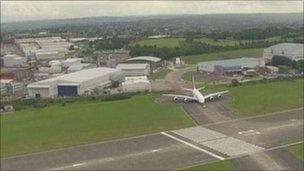Filton Airfield aviation museum gets Bristol mayor's backing
- Published

Owners BAE Systems closed Filton airfield at the end of 2012 after it said it was no longer viable
Bristol Mayor George Ferguson has backed a plan to create a new aviation museum at the former Filton airfield.
The site closed at the end of 2012 after its owner, BAE Systems, sold the bulk of the land to developers.
The Bristol Aero Collection Trust (BACT) plans to create an aviation heritage museum and learning centre on the remaining part of the site.
Mr Ferguson said it would be fitting for the proposed museum to be located at Filton, given its aviation heritage.
In a letter to BACT chairman Iain Gray, Mr Ferguson said: "The Bristol Aeroplane Company was one of the first and most important British aviation companies and Bristol's links to the history of flight forms an integral part of the city's unique identity.
Financial backing
"It is a past well worth celebrating and I am pleased to see the profile of Bristol's key role being raised through the establishment of an aviation museum at a time when there is some very real concern at the loss of the airfield."
BAE Systems pledged to provide financial backing of £2m and an eight-acre section of the airfield to support the BACT plans for the museum and a learning centre.
It also pledged £400,000-worth of design, construction consultancy and management support to the project.
The backing will form part of a funding application by BACT to the Heritage Lottery Fund, which is due to be submitted shortly.
The proposals include a new building to house Concorde 216, the final supersonic airliner built and the last whole aircraft to be produced on the Filton site.
Filton was in operation for more than 100 years and was the site of the first UK test flight of the Concorde prototype in 1969.
Aircraft manufacturer Airbus operated flights at the airfield for its employees who worked nearby.
In April 2012, BAE Systems said Filton was no longer viable.
The airfield was subsequently sold to London-based property developer Bridgehouse Capital and closed on 31 December with the loss of 19 jobs.
- Published21 December 2012
- Published18 December 2012
- Published17 December 2012
- Published27 November 2012